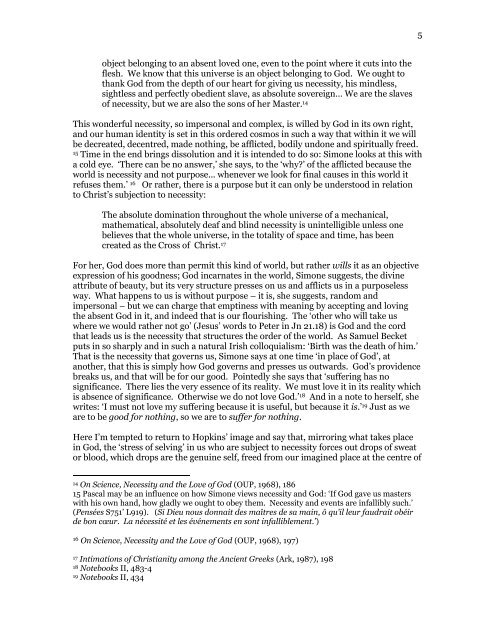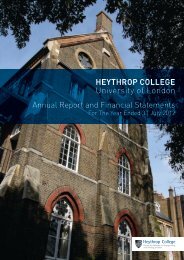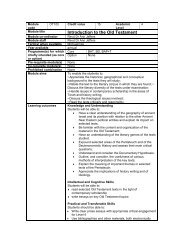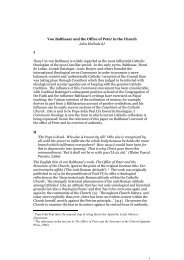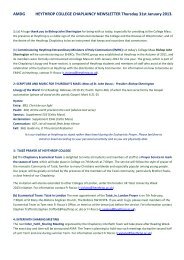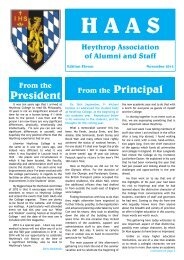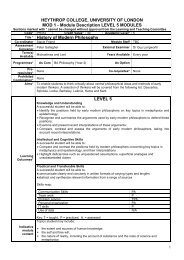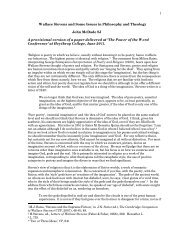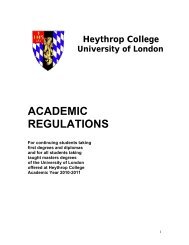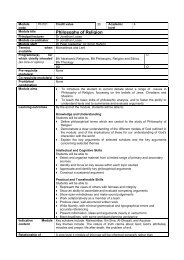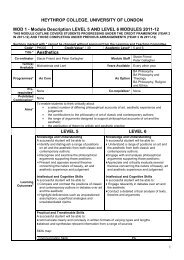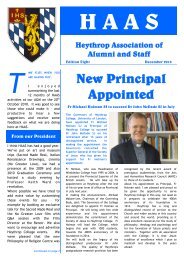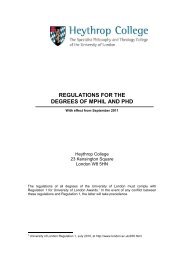Simone Weil: Affliction and Necessity
Simone Weil: Affliction and Necessity
Simone Weil: Affliction and Necessity
You also want an ePaper? Increase the reach of your titles
YUMPU automatically turns print PDFs into web optimized ePapers that Google loves.
5object belonging to an absent loved one, even to the point where it cuts into theflesh. We know that this universe is an object belonging to God. We ought tothank God from the depth of our heart for giving us necessity, his mindless,sightless <strong>and</strong> perfectly obedient slave, as absolute sovereign… We are the slavesof necessity, but we are also the sons of her Master. 14This wonderful necessity, so impersonal <strong>and</strong> complex, is willed by God in its own right,<strong>and</strong> our human identity is set in this ordered cosmos in such a way that within it we willbe decreated, decentred, made nothing, be afflicted, bodily undone <strong>and</strong> spiritually freed.15Time in the end brings dissolution <strong>and</strong> it is intended to do so: <strong>Simone</strong> looks at this witha cold eye. „There can be no answer,‟ she says, to the „why?‟ of the afflicted because theworld is necessity <strong>and</strong> not purpose... whenever we look for final causes in this world itrefuses them.‟ 16 Or rather, there is a purpose but it can only be understood in relationto Christ‟s subjection to necessity:The absolute domination throughout the whole universe of a mechanical,mathematical, absolutely deaf <strong>and</strong> blind necessity is unintelligible unless onebelieves that the whole universe, in the totality of space <strong>and</strong> time, has beencreated as the Cross of Christ. 17For her, God does more than permit this kind of world, but rather wills it as an objectiveexpression of his goodness; God incarnates in the world, <strong>Simone</strong> suggests, the divineattribute of beauty, but its very structure presses on us <strong>and</strong> afflicts us in a purposelessway. What happens to us is without purpose – it is, she suggests, r<strong>and</strong>om <strong>and</strong>impersonal – but we can charge that emptiness with meaning by accepting <strong>and</strong> lovingthe absent God in it, <strong>and</strong> indeed that is our flourishing. The „other who will take uswhere we would rather not go‟ (Jesus‟ words to Peter in Jn 21.18) is God <strong>and</strong> the cordthat leads us is the necessity that structures the order of the world. As Samuel Becketputs in so sharply <strong>and</strong> in such a natural Irish colloquialism: „Birth was the death of him.‟That is the necessity that governs us, <strong>Simone</strong> says at one time „in place of God‟, atanother, that this is simply how God governs <strong>and</strong> presses us outwards. God‟s providencebreaks us, <strong>and</strong> that will be for our good. Pointedly she says that „suffering has nosignificance. There lies the very essence of its reality. We must love it in its reality whichis absence of significance. Otherwise we do not love God.‟ 18 And in a note to herself, shewrites: „I must not love my suffering because it is useful, but because it is.‟ 19 Just as weare to be good for nothing, so we are to suffer for nothing.Here I‟m tempted to return to Hopkins‟ image <strong>and</strong> say that, mirroring what takes placein God, the „stress of selving‟ in us who are subject to necessity forces out drops of sweator blood, which drops are the genuine self, freed from our imagined place at the centre of14 On Science, <strong>Necessity</strong> <strong>and</strong> the Love of God (OUP, 1968), 18615 Pascal may be an influence on how <strong>Simone</strong> views necessity <strong>and</strong> God: „If God gave us masterswith his own h<strong>and</strong>, how gladly we ought to obey them. <strong>Necessity</strong> <strong>and</strong> events are infallibly such.‟(Pensées S751‟ L919). (Si Dieu nous donnait des maîtres de sa main, ô qu’il leur faudrait obéirde bon cœur. La nécessité et les événements en sont infalliblement.’)16On Science, <strong>Necessity</strong> <strong>and</strong> the Love of God (OUP, 1968), 197)17 Intimations of Christianity among the Ancient Greeks (Ark, 1987), 19818 Notebooks II, 483-419 Notebooks II, 434


